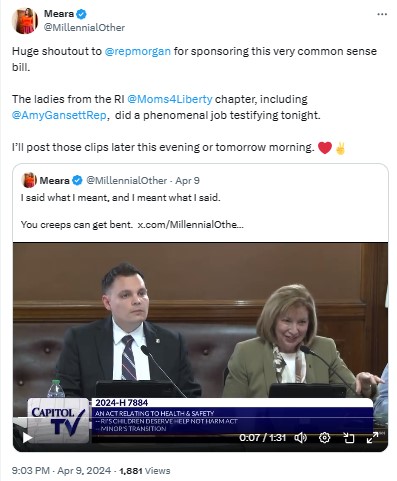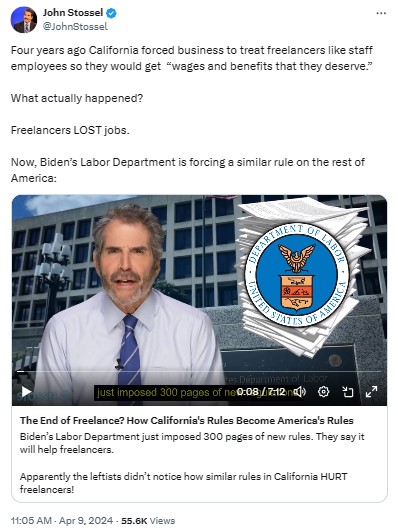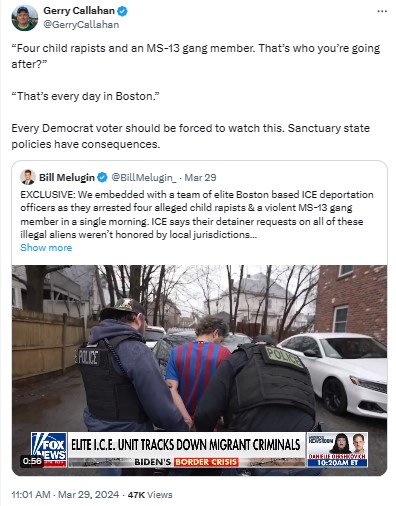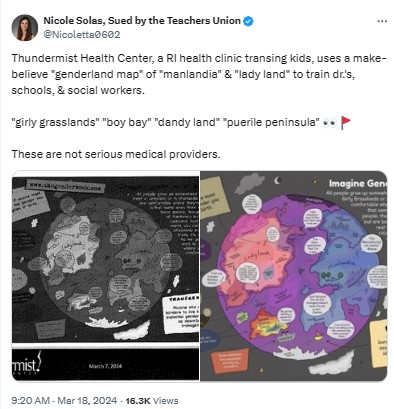The short answer is that we shouldn’t, but Bill Bartholomew’s attempt is worth a double-take and some thought about what he’s missing:
at nearly 68k, Scott Avedisian’s termination payment is almost as much as the contract that the most exciting player in college basketball, Caitlin Clark, signed after being selected first overall in the WNBA draft last night
The tweet is a fine example of a particularly progressive means of argumentation. Bartholomew presents two news items that have nothing in common other than the fact that they both involve people being paid money related to jobs. The context and phrasing make clear that he thinks the comparison shows self-evident injustice. The disgraced white Republican male (presumably getting no credit for being gay, in this context) collects a parting check from a state agency, while “the most exciting player in college basketball” languishes with low pay, as the latest example women making less money as professional athletes.
Thus, the argument, such as it is, derives from little more than a projection of a virtue signal. And because the self-evident nature of the injustice substitutes for explanation, the complaint is an invitation for any sort of policy suggestion that progressives can assert will make a difference. Predictably, explanation of the mechanisms that make any policy likely to work will be passed over in favor of assertions that progressive policies can’t help but resolve progressive problems.
A grown-up polity, however, has to put some details on its analyses. I’m no fan of Avedisian, or the Rhode Island Public Transit Authority (RIPTA), for that matter, but the job he’s leaving is as the chief executive of an agency with a nine-figure budget. We can debate the public policies of the agency, but thousands of people rely on it for both economic production and day-to-day living and urgent needs. To run this organization, the chief has to navigate an uncomfortable political atmosphere in which he or she is always one bad decision away from a scorching public spotlight, and special interests are constantly pulling every lever they can find to get more out of the system.
Yeah, I know, woe is the lonely bureaucrat. The point is simply that it isn’t unreasonable for RIPTA to send the message that qualified people taking such a job don’t have to worry about being totally cut off on short notice should a moment of bad judgment (even really bad judgment) make them politically vulnerable.
On the other side of the comparison, we should note that Clark’s pay is annual and, moreover, it probably isn’t even a substantial fraction of the money she can expect to make. The Women’s National Basketball Association (WNBA) — which does not have the profits of its men’s counterpart — is providing her a platform from which she will surely make millions of dollars endorsing products. That is how a free-market economy recognizes people for being “the most exciting player” in a sport.
In fact, if there is any unfair factor contributing to the level Clark’s pay, it’s probably the fact that the WNBA is unionized. I haven’t reviewed the terms of the union contract, but they tend to be levelling, making it more difficult for the league to recognize Clark’s unique situation. To be sure, men’s sports show that in high-variety, big-money ventures like professional sports, labor unions tend to be less able to demand rigid pay scales, but if the likes of Bartholomew are looking for villains in the identity politics war, there are plenty of alleys they can explore.
Featured image by Justin Katz using Dall-E 3.
[Open full post]The Rhode Island Office of Revenue Analysis releases regular reports summarizing the state’s tax credit programs, and sometimes progressive politicians and journalists get a news story out of them. What’s disappointing is the paucity of the opposing voices. According to Katherine Gregg’s Providence Journal article the Rhode Island Business Coalition is fine with ending the program for any new participants.
For their part, the authors of the report acknowledge that the businesses that use the program tend to be among the largest, so without programs designed to make them stay, like tax credit programs, the state’s economy could suffer.
There we see the underlying problem that nobody wants to address. Rhode Island’s economic policy is terrible. We’ve taken a beautiful state in a great location and made it so difficult and risky to operate in that we have to lure businesses here. Progressives with a coherent philosophy should realize this is their ideal policy. They get to pick and choose who gets relief from what imposition and to maintain a lever for bribery and ideological pressure.
I’m all for ending tax credit programs, but we should lower taxes and regulations generally. If we make Rhode Island a beacon for economic activity, businesses will pay their full taxes to be here.
[Open full post]I don’t want to read too much into a few seconds of video, but something is chilling about progressive Democrat Representative Brandon Potter’s face as Meara began to speak in favor of Republican Representative Patricia Morgan’s bill to prevent transgender-related mutilation of children:
His facial expression is not just of hatred. It’s cold, as if promising that one day he hopes not to have to sit there and be polite while people speak blasphemies.
[Open full post]That means most of us have to be servants to somebody else. That’s why a political party that still pretends it’s “for the little guy” is relentlessly targeting “little guys” who work for themselves. This video from John Stossel is worth watching:
If you’re independent, you’re difficult to manage. If top-down government can pressure top-down business with the aid of top-down labor unions, things are easier (and more profitable) for the people at the top.
[Open full post]For those of us who’ve been mystified by economic news, E.J. Antoni’s summary of results from the March employment report is worth a read. The key confusion is that “the headline numbers once again look good.” Yet, all the jobs are part time, with Americans replacing their full-time jobs with multiple part-time ones to make ends meet. This finding is found in both the divergence of measures that count workers and jobs and in the number of people working multiple jobs.
Meanwhile, hours per week are trending down, and the ratio of jobs that are government is growing. Too few private-sector jobs are generating economic productivity to support the government jobs. Moreover, most of the “private sector” jobs are actually in fields that are more like government satellites, like health care.
Now add the fact that labor-force participation is down, and the jobs are entirely going to people who are foreign born. There’s nothing wrong with that, per se, but at a time of massive illegal immigration, it presents a troubling picture.
Things are not going well under Biden, no matter what the propagandists insist.
[Open full post]This seems kind of like an important story, but despite some weeks, I’ve seen nothing on it elsewhere:
The problem with our current media situation is that, whether Callahan’s assessment about sanctuary state policies is fair or not, we know for a certainty that we’ll only ever hear that it is not fair from the partisan media, if we hear of the situation at all. They leave us completely in the dark when it would be politically inconvenient to do otherwise.
[Open full post]On WNRI 1380 AM/95.1 FM, John DePetro and Justin Katz discuss:
- Mark Patinkin says what cannot be said
- An uncommitted delegate’s commitment to Hamas
- The unknown cost of the Superman Building
- The Matos signature controversy starts small
- Forgone Washington Bridge opportunities for RIGOP
- An unexplored Cranston controversy
- Avedisian departs
- A possible promotion of Morgan by the Projo
Featured image by Justin Katz using Dall-E 3 and Photoshop.
[Open full post]A point I made yesterday in an essay on Dust in the Light was that we communicate with God in where we choose to direct our attention, and one of the ways in which we make that choice is by how we act. Taking an action is like moving your position on the landscape; your observations will be made in a world in which you took the action. Call it “action space.”
Revisiting James Lindsay’s analysis of Joe Biden’s trans-Easter affront has a related ring:
This provocation, published yesterday, is overwhelmingly likely aiming to feed into those prevailing active measures (“ops”) meant to drag Christians into a positions of fruitful reaction that the Regime can use to clamp down on them. Again, Christian reaction is their real action, and we know for certain that Christian circles are deeply infiltrated with a chest-beating and growing radicalism that is being baited toward and associated with a growing antisemitism. The responses to this post will almost certainly prove this out, btw. Your evil government wants this to happen. They are baiting you into it.
Because we live in a world of free will and Original Sin, God’s is not the only determinant of how the world responds to our actions. Other people play a role, and that can be manipulated. Activists can attempt to provoke actions, as Lindsay suggests, or they can use other techniques, like creating confusion by reacting in contrary ways.
In any event, such manipulation is contrary to fair play, pluralism, and democracy. It’s truly diabolical.
[Open full post]Keep in mind that Thundermist Health Center is interwoven with Rhode Island’s political elite and is working within our school districts:
The “health center” is encouraging mental illness, not helping people with it.
[Open full post]Somehow, despite ample reason for civic disappointment, I find I’m becoming less cynical as I get older, not more. Even now, when I come across reasoning like that expressed by young progressive Democrat Representative David Morales, I can’t help but feel hope that we can salvage reason from the flames of ideology:
Here’s the reality: if wages had kept up with worker productivity, the Minimum Wage would be over $23
Specifically, in Rhode Island, a single parent working full-time needs to earn $37 an hour to cover their family’s basic needs.
A $20 Minimum Wage isn’t radical!
The cynical voice of my younger self insists that Morales doesn’t actually care if he’s correct. He’s got marching orders for a particular policy (an ever-higher minimum wage) and will articulate any points he thinks will move it forward. Meanwhile, practical experience has taught me that points about economics and unintended consequences are discouragingly weak.
Arguments that the government is pricing many people right out of their jobs will fall to disbelief, reinforced with (questionable, in my view) progressive research, coupled with an underlying expectation that such consequences will only make the next stage of “progress” toward socialism easier. Suggesting that minimum wage jobs aren’t meant to be family-supporting — let alone hinting that we should also give some attention to the problem of single parenthood — smashes against non-judgmentalism about others’ expectations.
Nonetheless, I find hope in Morales’s attempt to bring productivity into the equation, because it indicates an area that he hasn’t thought through, and seeds of reason might grow in fallow ground.
A worker should absolutely make more money as he or she becomes more productive, because his or her work becomes more valuable per hour. However, when “workers” become more productive as a group because some technique or technology created efficiencies, it is a communal good whose benefit should be shared by all. If you discovered that a new, inexpensive, and easy-to-use tool enables your local car mechanic to finish an expensive repair in one-quarter the time, will you be happy that he’s kept his price for the job the same? No. You’ll look for another mechanic who has reduced the price. Then, competition between mechanics will divide up the benefits between the business owners, the employees, and the consumers.
Reality is complex and messy, but in a free system, the owners’ administration and investments would balance against the workers’ skill and the consumers’ wealth and access to other options. In the ideal situation, the owner would receive a proportional reward that encourages continued innovation; the workers’ reward would come in the value of their new skill and their ability to more-easily become managers and owners, themselves; and consumers would save money on this good or service and redirect that pool of wealth to the next area in which society places value and wants innovation.
When government gets involved — whether, in a given case, it is engaged in protectionism for the owners, redistribution for the workers, or socialism for the consumers — it is not working from economic incentives, but political incentives. Government introduces another group, politicians, who seek to take some of the benefit for their own gain in a way completely divorced from the actual transaction. They aren’t pure, and they aren’t guided by what’s fair and just. They profit by giving one or the other constituency more than it would receive if the balance were found naturally. It makes an economic transaction a measure of raw power.
Ultimately, those who share Morales’s view have lost sight not only of the individuals they imagine they support, but also the prioritization of the common good they claim to desire. They break us into warring factions of workers and bosses when in reality we’re a cooperative community, in which each of us usually plays all roles at different times and in different circumstances.
I believe the common good is an area of shared priority, and I hope our culture is still open-minded enough for progressives to remember that as they surge in power.
Featured image by Justin Katz using Dall-E 3.
[Open full post]








